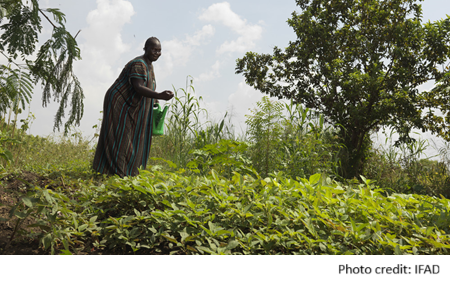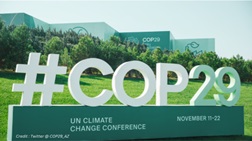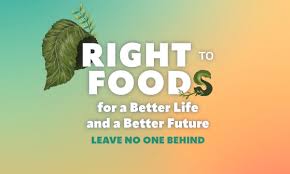November 25 is International Day for the Elimination of Violence against Women and marks the beginning of the UNiTE campaign’s annual 16 Days of Activism against Gender-Based Violence. This year the UN mark’s the 16 Days under the theme “UNiTE! Activism to end violence against women and girls", urging all of us to play a role in ending violence against women and girls, to show support and solidarity to women’s rights activists, and to resist the rollback on women’s rights. Click here to read UN Under-Secretary-General Sima Bahous’s “Push Forward” statement in which she outlines three important calls to action. And watch this inspiring 2-minute video from UN Women: Against the Pushback, We Push Forward.
The international climate change conference, COP27, ended in the early dawn hours of Sunday morning with celebration on creation of the Loss and Damage Fund, the result of 30 years of advocacy by developing countries and civil society. The details of the fund will be developed over the next year or two.
"This decision, taken on African soil, brings hope for vulnerable impacted peoples and communities not just in the continent, but for the entire Global South”, stated Tasneem Essop, Executive Director, Climate Action Network International. However, “(w)hile COP27 begins to address the consequences of the climate crisis, it failed to commit to phasing out fossil fuels, which are at the root of the climate crisis. More fossil fuel extraction means more losses and damages and more devastation. We need a rapid yet equitable transition away from the fossil era to renewables."
Canada played a constructive role at COP27, voicing support for loss and damage and language related to a phase-out of “unabated” fossil fuels. Click here to listen to Canada’s Catherine Abreu, founder and Executive Director of Destination Zero, reflect on the outcomes of the event and her optimism for the future going forward (23:18 min).
The intense negotiations over the past two weeks took place with the backdrop of the prolonged drought and imminent famine affecting millions of people in the Horn of Africa. Click here for the CBC interview with Pulitzer Prize-winning photojournalist Lynsey Addario who recently visited Somalia on assignment for National Geographic.
The focus now shifts to each country and the actions needed to avert climate collapse. Civil society continues with a critical role to play.
The recent surge in hunger has exposed the fragility of the global food system. In a recent letter to world leaders, more than 70 groups, including the 200-million-member Alliance for Food Sovereignty in Africa, are urging greater investment in agroecology practices and other forms of sustainable food production. In the longer term, it must be a political priority to involve farmers in decision-making and to address the historical injustices and inequities that plague our food system. Click here to read more.
As envoys from around the world gather in Sharm el-Sheikh, Egypt, for the UN's 27th annual climate change conference, countries in the Global South will be asking for compensation for the losses and damages that they are already suffering as the climate crisis escalates.
Click here to learn more about loss and damage and the push by the Global South for solutions to address climate injustice and inequity. The link includes an excellent video on the issue.
Click here for a "light read" primer on COP27. This GRAN News Post is the first of four posts throughout the month of November that will bring news related to COP27 including voices from Africa and the Global South, the solutions that will be discussed, and Canada’s response.
By the end of 2021, nearly half of the world’s population had received two doses of a COVID-19 vaccine. But those vaccines were not distributed equitably: vaccination rates were 75% in high-income countries, but less than 2% in some low-income countries.
Mathematical epidemiologists at the University of Warwick in Coventry, UK used data on mortality and vaccine availability to model what would have happened if vaccines had been distributed according to need rather than wealth. The team found that more equitable vaccine coverage could have prevented 1.3 million deaths worldwide.
Click here to read more about the implications of this study.
"Far from a progress report, this document describes a reversal. Women’s and children’s health and rights are threatened to a degree not seen in more than a generation." António Guterres, Secretary-General of the United Nations
Protect the Promise, a new UN report, shows that women’s and children’s health has suffered globally, as the impacts of conflict, the COVID-19 pandemic and climate change converge with devastating effects on prospects for children, young people and women.
Click here for more details and a link to the full report.
What does it mean to take global health to the next level?
A new global agreement based on a shared vision.
A new global architecture that is coherent and inclusive.
A new global approach that prioritises promoting health and preventing disease, rather than only treating the sick.
Because health is not a cost, it’s an investment. It’s not simply an outcome of development, but the means. It’s not a luxury, but a fundamental human right.
Click here to read the full text of WHO Director-General, Dr. Tedros Adhanom Ghebreyesus' keynote speech at the Opening Ceremony of the World Health Summit - 16 October 2022.
The Grandmothers Advocacy Network applauds and thanks the Government of Canada for its pledge of $1.21 billion to the Global Fund to Fight HIV, TB and Malaria. To read GRAN's full response to the welcome news of Canada's ambitious pledge, click here.
Watch this 6-minute video as global health expert Dr. Madhu Pai takes the podium at the International AIDS Conference in Montreal and delivers a searing indictment of the racism underpinning global health inequities.
"Right now, if you are hosting a global health conference in US, UK, Canada, EU or Australia, you have decided that it’s acceptable to exclude people from the Global South. How global is your global health?" -- Dr. Madhu Pai
Dozens of protesters took over the stage at the opening ceremony of the 24th International AIDS Conference in Montreal to condemn Canada’s denial of visas to “high numbers” of delegates from the Global South.
Dr. Adeeba Kamarulzaman, President of the International AIDS Society and International Co-Chair of AIDS 2022, says her organization will re-evaluate how it organizes international conferences as a result of visa denials by the Canadian government. "Underlying the difficulty experienced by many attendees of AIDS 2022 to enter Canada lies a broader problem of global inequities and systemic racism that significantly impacts global health."
Click here to read more.
Pages


